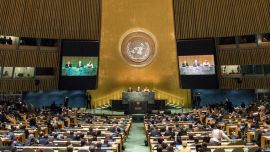"They say I'm extreme, but extreme in what?" asked Chile's far-right presidential candidate José Antonio Kast.
The 55-year-old, an admirer of Augusto Pinochet's dictatorship who sings from the same songsheet as leaders like Jair Bolsonaro and Donald Trump, said he preferred to be called a “candidate of common sense.”
"Don't call me far-right, because I'm not," he told a journalist at a meeting with foreign correspondents this week, ahead of Chile’s presidential election this Sunday.
The latest surveys, issued 15 days before Sunday’s election, put Kast in first place with around 20 percent of a fractured vote. If it goes as the polls expect, the lawyer will find himself in a second round run-off against Gabriel Boric, the young candidate of the leftist coalition Apruebo Dignidad, which brings together the Frente Amplio and the Partido Comunista.
But since 2019, Chileans have been called in for several elections, referendums and constitutional votes. The polls have mostly been wrong.
Kast was an activist in the ultra-conservative Unión Demócrata Independiente (UDI) party for 20 years, before creating the Partido Republicano two years ago. In 2017, in the last presidential vote, he came fourth with 7.93 percent.
Married with nine children, the far-right politician and former national deputy is an active member of the conservative Schoenstatt Catholic movement. The son of German immigrants who arrived in Chile in 1951, Kast’s father joined the Army during the regime of the Nazis, though the presidential hopeful has explained this away by saying the decision was “an obligation” for his father.
Once in Chile, the family settled in the town of Paine, on the outskirts of Santiago, where they made their fortune with a traditional German sausage factory and a restaurant chain named Bavaria, which they later disbanded.
Human rights groups claim that members of Kast’s family collaborated in the detention of opponents in the town of Paine during the Pinochet dictatorship.
In the final stretch of the campaign, the candidate’s unabashed support for the late dictator has railed many who are still scarred by this dark period in the country’s history. Yet a part of the population, while admittedly a minority, remembers "the order" Pinochet imposed with nostalgia, along with the economic growth enjoyed during the dictator’s 17 years in charge.
"There is a situation that marks a difference with what is happening in Cuba, Venezuela and Nicaragua. I believe that what happened in Nicaragua fully reflects what did not happen in Chile [under Pinochet]: democratic elections were held and political opponents were not imprisoned. That makes the fundamental difference," Kast said during one of the campaign’s presidential debates.
"Kast represents the most recalcitrant part of the Chilean right, which unfortunately continues to be a hard core of pinochetismo, authoritarianism and xenophobia," Claudia Heiss, a political science academic at the University of Chile, told AFP.
If elected, the former lawmaker has vowed to cut government spending, reduce taxes and eliminate several ministries, including the portfolio dedicated to women and diversity.
He is the only one of the seven candidates who has said he would retain the private pension system set up during the dictatorship, which has been widely criticised by the public.
– TIMES/AFP

























Comments